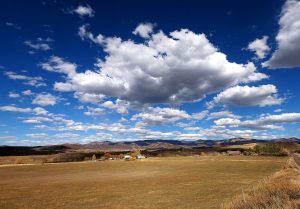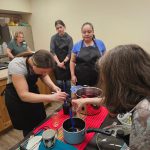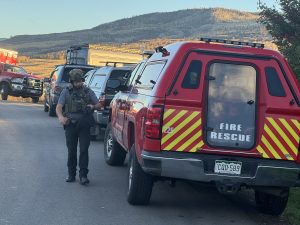‘A great point of connection’: Routt County CSU Extension canning classes blend tradition with science
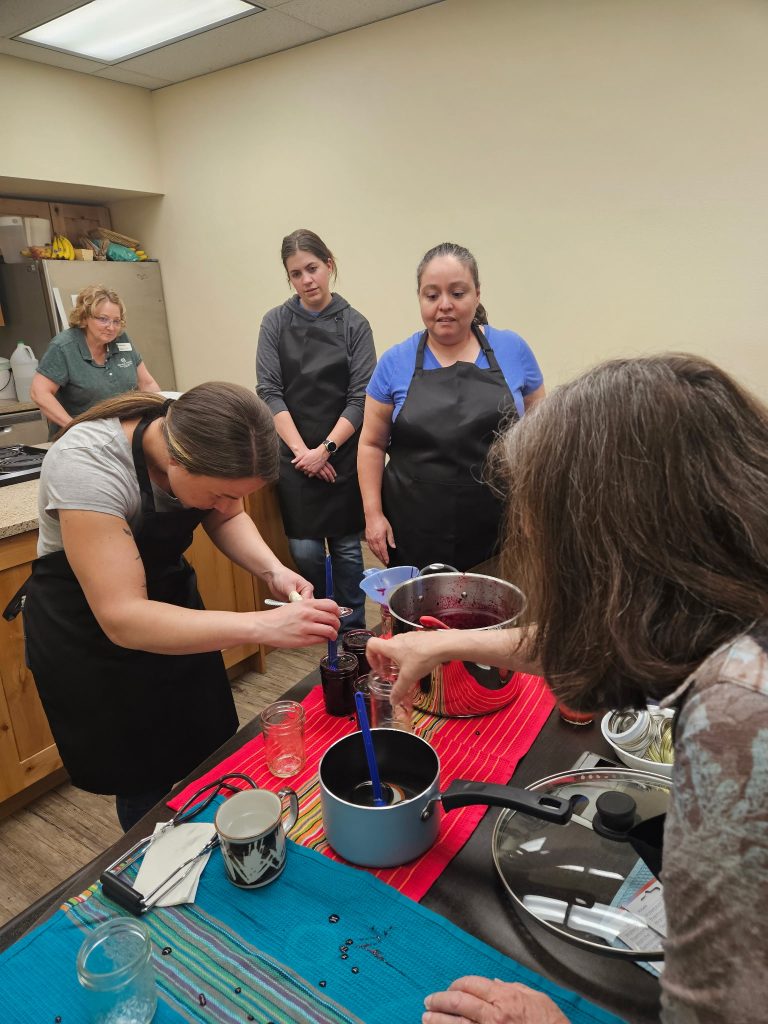
Courtesy Photo/Katie Maloney
Canning has been a tradition in American kitchens since the 1800s, allowing individuals and families to preserve food through the colder months while also bringing people together. The Colorado State University Extension office is keeping both traditions alive in the Yampa Valley with a series of canning classes throughout the fall that focus on history, technique and safety.
Katie Maloney, a family and consumer science specialist with CSU Extension, said the classes are part of the land-grant university’s mission to bring research-based education to local communities.
“CSU Extension and Extension offices in general are an outreach and education arm of the land-grant university in every state,” Maloney said. “It is our role as Extension specialists to provide educational resources for the community, including those surrounding canning.”
Maloney’s own path to this work began with a background in human nutrition and food science. She earned a master’s degree from Colorado State University with a focus on community nutrition and started with the CSU Extension last October.
“I really came to work in the food world through my interest in nutrition,” she said. “This role gives me the opportunity to help people with food preservation, cooking and overall well-being.”
Canning gained momentum during World War II as households were encouraged to preserve food for the home front while farm production supported the war effort. Maloney said that peak in home preservation still influences food culture today.
“Our understanding of food safety, canning and how we can safely preserve food at home has evolved over the years,” she said. “It’s our role to bring the best information possible to people so that they know how to safely preserve food at home.”
That emphasis on safety is more than just theoretical. Maloney noted that improperly canned food can create an environment for Clostridium botulinum, the bacteria that produces the dangerous botulism toxin, which can be fatal.
“We want to make sure people are preserving their food in a manner where it does not breed foodborne illness,” she said. “Safety is definitely a top concern, because you’re working with glass, heat and pressure, and if you’re not doing it in a safe way, there’s definitely opportunity to get injured.”
This fall’s classes will rotate through several Yampa Valley communities. The most recent class, which focused on water-bath canning fruit, took place Sept. 12 in Craig. An Oct. 11 class in Oak Creek will teach pressure canning meat and is timed for 4-H families and hunters who are preparing to store fall harvests. The final class of the year will be Nov. 19 in Steamboat Springs and will also focus on pressure canning.
Maloney works alongside a team of trained volunteers who have completed the Master Food Safety Advisor program. Together, they facilitate the small-group classes, which allow participants to get hands-on experience in a working kitchen.
“We really try to focus on touching a range of different communities in the region through these canning classes,” she said. “Any time you can gather with people around food, whether it’s gathering for a meal or gathering to cook together or to can together, it’s a great point of connection.”
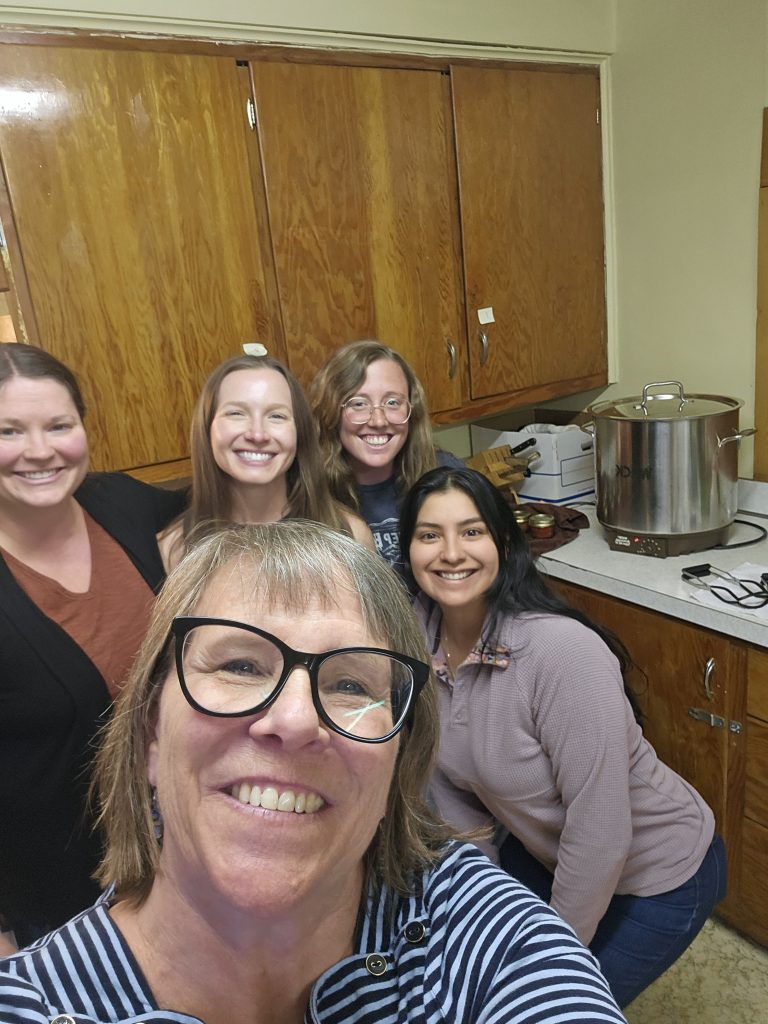
The classes attract a variety of participants ranging from people who remember canning with their grandparents to newcomers who want to be more self-sufficient, particularly with increasing food prices.
“Some people are coming in because they canned with their grandmother and want to learn to can for themselves,” Maloney said. “Others are coming in because they have a home garden that they’re looking to preserve. It’s really a wide range of reasons why people are brought to the class.”
For Maloney, one of the most rewarding parts of the program is helping participants replace unsafe habits with up-to-date practices.
“There is so much misinformation out there about how you can preserve food at home and what it looks like to do it safely,” she said. “A lot of recipes that exist on blogs or in magazines may be evaluated for taste, but that doesn’t mean they’ve been evaluated to make sure that the process is safe.”
She offered several top tips for safe canning including following a tested recipe from a trusted source, using water baths for high-acid foods, pressure canning for low-acid foods like meats and vegetables, and adjusting for elevation.
“It’s important to know the elevation of where you live because we do live in a mountainous region where the difference between where my kitchen is located and downtown could change dramatically,” she said. “That does impact your processing time for canning.”
She added that starting with high-quality ingredients is critical, noting that bruised or overripe produce can invite bacterial growth.
Maloney emphasized that CSU Extension is available year-round to answer questions, test pressure canner gauges and connect residents to reliable canning resources like the USDA Home Canning Guide.
“If you have questions, your local Extension office is a great place to start,” she said. “We can connect you with trusted resources and whatever you need to can successfully and safely at home.”
For Maloney, the work is as much about connection as it is about science.
“Being able to tap into that shared history and community of bringing people together to connect over food is really powerful,” she said.
Registration links for the fall classes are available through CSU Extension’s Routt County office. To be added to a waitlist, visit TinyUrl.com/RCCanning2025.
For more information on the Routt County Extension of CSU, visit Routt.Extension.ColoState.edu.

Support Local Journalism

Support Local Journalism
Readers around Steamboat and Routt County make the Steamboat Pilot & Today’s work possible. Your financial contribution supports our efforts to deliver quality, locally relevant journalism.
Now more than ever, your support is critical to help us keep our community informed about the evolving coronavirus pandemic and the impact it is having locally. Every contribution, however large or small, will make a difference.
Each donation will be used exclusively for the development and creation of increased news coverage.
